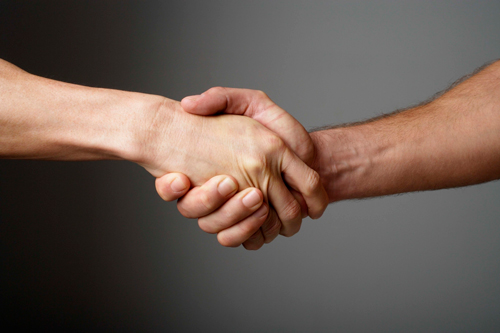
Shake Hands with Dupuytren’s Contracture
What did Ronald Reagan, Margaret Thatcher, and Samuel Beckett have in common?
The answer is Dupuytren’s contracture.
What is Dupuytren’s Contracture?
Dupuytren’s contracture is a progressive, slow-moving condition that affects the connective fibrous tissue in the hand.
- It is characterized by the thickening and shortening of the palmar fascia, the tissue that lies beneath the skin of the palm.
- Over time, this condition leads to the formation of tight bands or cords that pull the fingers toward the palm, causing them to curl.
- While this condition primarily affects the fingers, it can significantly impact a person’s ability to perform daily activities.
Prevalence and Risk Factors
- Dupuytren’s contracture is more common in men, particularly those of Northern European descent, and it typically manifests in individuals over the age of 50.
- It is also more prevalent among those who smoke heavily or consume alcohol.
- Genetic factors play a significant role in the development of this condition, and having a family history of Dupuytren’s contracture increases the risk.
- Although Margaret Thatcher’s case may seem unusual, it highlights the fact that Dupuytren’s contracture does not exclusively follow the typical demographic profile.
Symptoms and Early Detection
People suffering from Dupuytren’s contracture usually become aware of the condition when the skin on the palm of their hands starts to thicken.
Early signs often include:
- Lumps: Small, nodular growths can appear in the palm.
- Puckering: The skin may begin to pucker or dimple.
- Dimpling of the Skin: The skin can develop a dimpled appearance before any noticeable pain or discomfort arises.
Progression of the Condition
Dupuytren’s contracture tends to move at its own pace.
- For some people, it progresses slowly and remains relatively stable, while others might find it advancing more quickly.
- As the condition develops, the tissue in the palm thickens and tightens, causing the fingers to curl more and more.
As the condition progresses, more tissue becomes affected, leading to the formation of tight bands or cords. These bands can cause the fingers, particularly the fourth and fifth fingers, to curl toward the palm.
This curling can interfere with hand function, making everyday tasks such as shaking hands, grasping objects, or performing intricate tasks increasingly challenging.
Treatment Options
Non-Surgical Interventions
Although Dupuytren’s contracture is typically painless, treatment may help relieve discomfort and preserve the hand’s range of motion.
The choice of treatment depends on the severity of the condition and its rate of progression.
For many patients, nonsurgical interventions can be effective in managing symptoms and improving hand function.
Common nonsurgical treatments include:
- Corticosteroid Injections: These shots help reduce swelling and soften the thickened tissue in your palm. They can ease your symptoms and slow down how quickly the condition gets worse.
- Needle Aponeurotomy: This procedure uses a needle to break up the thick bands of tissue that are pulling your fingers down. It helps to improve hand movement and makes the condition less severe.
- Collagenase Injections: This treatment involves injecting an enzyme that breaks down the thick cords in your hand. This makes it easier for the doctor to stretch your fingers back into a more normal position. It can be especially helpful if your contracture is more advanced.
Surgical Treatment
In cases where nonsurgical treatments are insufficient or the condition is severe, surgery may be necessary.
Surgical options include:
- Fasciectomy: This surgery takes out the thickened tissue from your palm and fingers. It can help with the contracture, but you’ll need a lot of physical therapy afterward to get your hand moving well again.
- Dermatofasciectomy: This is a more involved surgery where they not only remove the thickened tissue but also take off some of the skin on top. They might use a skin graft to cover the area. This is usually done for more serious cases.
- Partial Fasciectomy: This surgery removes just part of the thickened tissue. It’s less invasive than the full fasciectomy and might be used along with other treatments to get the best results.
The Role of Physical Therapy
Importance of Physical Therapy
For mild cases or to support other treatments, physical therapy is a safe, effective way to alleviate symptoms of Dupuytren’s contracture.
Physical Therapy Techniques
A tailored physical therapy program can include various techniques to address Dupuytren’s contracture:
- Massage Therapy: Gentle massage can help improve blood flow to the affected area, reduce swelling, and soften the thickened tissue.
- Stretching Exercises: Regular stretching exercises can help maintain and improve the flexibility of the fingers and hand. These exercises are designed to counteract the contracture and promote better hand function.
- Therapeutic Tools: Physical therapists may use various tools to aid in treatment, such as splints or devices designed to stretch and support the fingers in their normal position. These tools can help maintain hand function and prevent further contracture.
- Splinting: Custom-made splints can be used to keep the fingers in an extended position, helping to counteract the effects of the contracture. Splinting can be particularly useful during sleep or rest periods.
- Alternative Movements: Therapists may also guide patients in adopting alternative movements and techniques to perform daily tasks despite the limitations caused by Dupuytren’s contracture. This can include adaptations for writing, using pockets, putting on gloves, or shaking hands.
Did you know you have Direct Access* to Physical Therapy? No referral, no problem!
Final Thoughts
Whether you are experiencing early signs of Dupuytren’s contracture or need support following surgery, physical therapy can play a vital role in improving hand function and quality of life.
At The Jackson Clinics, we offer comprehensive physical therapy programs designed to address the specific needs of individuals with Dupuytren’s contracture.
Don’t let Dupuytren’s contracture stop you—contact us and start your journey to better hand health.
The Jackson Clinics serves 18 locations throughout Northern Virginia.
Find one near you: https://thejacksonclinics.com/locations/









